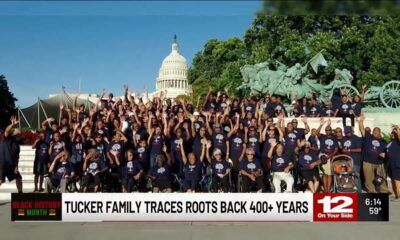Mississippi Today
Debate over deer-dog hunting in Mississippi continues after Supreme Court ruling

For centuries, hunters have trained dogs to be their poaching companions. First President George Washington even had a collection of hounds for hunting foxes.
Fast forward to today, hunting with dogs – specifically for deer – has a more complicated reputation. Using dogs to hunt whitetail deer, the most common type of deer in North America, is only legal in nine states, including Mississippi.
Hunters and private property owners have butted heads for years over the practice, with land owners complaining about hunting dogs straying onto their land and disturbing their peace. While hunters use dogs to chase down several types of game, dog-deer hunting typically covers more ground. According to the Mississippi Department of Wildlife, Fisheries and Parks, the state receives such complaints every year.
In May, the state Supreme Court tackled one such dispute. In 2020, a couple of Prentiss County landowners, the Dickersons, sued a group of nearby dog-deer hunters, the Allens, after years of complaining to the local sheriff about the Allens’ dogs winding up on their land, which the Dickersons used for their own “still” hunting.

A lower court imposed an injunction preventing the Allens from letting their dogs on the Dickersons’ land, and the Supreme Court affirmed the decision this spring. In his opinion, Judge Leslie King wrote: “Two long-standing but competing interests are at issue in this case: the right to the quiet enjoyment of property versus the right to hunt and harvest wildlife.”
Greg Beard, an attorney for the Dickersons, said this was the first such case in the state to find a hunting dog to be a nuisance. While he believes the case set a precedent, Beard argued that the decision still leaves a gap in regulating dog-deer hunting.

“The Dickerson’s had to take matters in their own hands because there was no other remedy,” Beard told Mississippi Today. “Technically the Allens were not violating any criminal law. As long as they stayed on the public road, their dogs can’t trespass…I think you do have leeway as a dog runner where you’re not going to get an injunction against a dog runner unless it’s a frequent occurrence.”
Other hunters in the state, like Preston Sullivan in southwest Mississippi, agree that dog-deer hunting can be a nuisance.
“We’re hunters, too,” Sullivan said. “But property rights take precedence over hunting rights.”
In 2009, Sullivan started the Rural Property Rights Association of Mississippi to speak out against the sport, advocating for a permit system that would punish hunters when their dogs stray onto someone else’s property. While they successfully lobbied the state to create a permit system for the Homochitto National Forest in 2011, Sullivan’s mission has fallen short in the rest of the state.

Lawmakers’ attempts in recent years to address the issue have not gone far, including in the 2024 session.
“A hunter himself can’t legally go on somebody else’s property, but their dog can,” he said. “Their dog can go wherever it wants, and there’s no consequences for that. We want there to be consequences.”
David Smith, president of the Mississippi Hunting Dog Association, said Sullivan and others mischaracterize dog-deer hunting, and for the most part hunters are able to keep their dogs away from others’ private land.
He explained that modern dog collars have GPS tracking, and if the dog strays too far, the hunter can send a shock or vibration to try to stop the dog.
“You’ll have a dog from time to time get out of pocket, but not very often,” Smith said, estimating the collars do what they need to 90% of the time.

Smith added he didn’t think it’s fair to punish hunters if they’re on a large swath of land where dog-deer hunting is legal, and their dog then strays onto someone else’s land. He said private landowners should consider adding rightS-of-way where hunters can stop their dogs.
“It’s legal to hunt in a 280,000-acre national forest…you buy five acres and a dog comes across your five acres, and I got to pay a (fine),” Smith said. “That to me is just ridiculous.”
In a statement emailed to Mississippi Today, MDWFP said there’s little it can do to prevent hunters from running their dogs on other people’s land. It’s only if they see it happening, the agency said, when they can issue a citation.
Part of the issue, the agency added, is the change in land use over recent years.
“Quite simply, there are fewer and fewer large undeveloped tracts of agricultural or forest lands,” MDWFP said. “Dogs don’t care if they’re too close to someone’s house when they’re chasing a deer – they only care about staying on the scent. Homeowners get antsy when they hear gunshots or see deer being chased by a pack of hounds, unless they grew up doing that very thing. Wide open spaces and the ability to roam at will are casualties of the evolution of society.”
This article first appeared on Mississippi Today and is republished here under a Creative Commons license.![]()
Mississippi Today
On this day in 1955

March 2, 1955

Nine months before Rosa Parks, 15-year-old Claudette Colvin refused to give up her seat to a white passenger on a city bus in Montgomery, Alabama.
“History had me glued to the seat,” the civil rights pioneer told the Guardian. “It felt as if Harriet Tubman’s hand was pushing me down on the one shoulder, and Sojourner Truth’s hand was pushing me down on the other. Learning about those two women gave me the courage to remain seated that day.”
She aspired to become a civil rights lawyer and when the bus driver ordered her to move, she responded, “It’s my constitutional right to sit here as much as that lady. I paid my fare.”
When two white police officers tried to drag her from the bus, she told them it was her constitutional right to stay. They handcuffed her, jailed her and charged her with violating segregation laws, disturbing the peace and assaulting a police officer. She learned of racism at a young age, and she was disturbed by what she heard in her all-Black school.
“One thing especially bothered me – we Black students constantly put ourselves down,” she said in “Twice Toward Justice.”
“The N-word – we were saying it to each other, to ourselves. I’d hear that word and I would start crying. I wouldn’t let people use it around me.”
After her arrest, she grew close with Parks. Other Black women followed her lead, refusing to surrender their seats, including Mary Louise Smith, Aurelia Browder and Susie McDonald. They brought the groundbreaking Browder v. Gayle lawsuit that resulted in Montgomery’s segregated bus system being declared unconstitutional.
“When it comes to justice, there is no easy way to get it,” she said. “You can’t sugarcoat it. You have to take a stand and say, ‘This is not right.’”
This article first appeared on Mississippi Today and is republished here under a Creative Commons license.![]()
Mississippi Today
Judge’s ruling gives Legislature permission to meet behind closed doors

Hinds County Chancellor Dewayne Thomas recently affirmed the ruling of the Mississippi Ethics Commission that the state Legislature is not covered by the open meetings law and thus can meet behind closed doors.
The Mississippi Open Meetings Act says specifically that all “policy making bodies” are subject to the law. But Thomas and the Ethics Commission majority said the law is referring to executive bodies, not the Legislature, when referencing policy making bodies.
Taking that ruling to the extreme begs the question of whether city councils and city boards of aldermen meetings are covered since they also are legislative bodies.
To exclude the Mississippi Legislature from the requirement of meeting in public seems questionable considering that the Legislature appropriates more public money than any entity in the state. And the Legislature is the state’s primary policy making body with immense power.
It also is worth noting that both the current and past director of the Ethics Commission disagreed with the ruling of the majority of the commission members. The former lead attorney for the Mississippi House, previously on the Ethics Commission, also opposed the ruling that the Legislature is not covered by the open meetings law.
This perplexing issue came to the forefront because of the House leadership’s ongoing practice of holding closed-door Republican caucus meetings where policy is discussed and unofficial votes are taken. It was argued that the meetings were illegal since Republicans comprise a super majority giving them many more members than needed to constitute a quorum.
The Ethics Commission made the ruling in 2022 that the Legislature was not subject to the open meetings law and Thomas, a former member of the House, upheld that ruling.
Senate Republicans, who also have a super majority, do not hold similar meetings because of the belief that it would be a violation of the open meetings law. When Phil Bryant presided over the Senate as lieutenant governor from 2008 until 2012, he was holding similar meetings until media members asked if the meetings were a violation of the open meetings law. He announced he would no longer hold the closed-door meetings.
The Mississippi Constitution does state emphatically, “The doors of each house (of the Legislature) when in session shall be kept open.”
Many of those who would argue that the Legislature is not covered by the open meetings law claim that the constitutional provision only applies to the limited time when a chamber gavels in and does not even cover the time when the Legislature is in session but not gaveled in. If a majority meets during the 90-day session at the speaker’s discretion to discuss business but does not specifically gavel into session, the constitutional provision would not apply, they claim.
Before the 2000 session of the Mississippi Legislature, then-Speaker Tim Ford called a meeting of the House members at a location away from the Capitol.
There was intense interest in the meeting since on the quickly approaching first day of the 2000 session the House would select the state’s next governor.
For the first time in the history of the state, the losing gubernatorial candidate was asking House members to decide the gubernatorial election under an antiquated and now repealed provision of the Mississippi Constitution. The provision said to win statewide office a candidate had to claim a majority of the popular votes and win the most votes in a majority of the 122 House districts. Democrat Ronnie Musgrove won the most votes, but did not win a majority.
Needless to say, Ford’s out-of-session meeting before that historic first-day vote generated interest. Under the ruling of the Ethics Commission and Thomas, the meeting would not have been subject to the open meetings law.
Ford allowed media to attend the meeting. The issue of whether the meeting was public did not arise.
It is difficult to recall an instance when Ford or other past speakers routinely held meetings of a majority of the House behind closed doors to discuss official business and to take unofficial votes.
In those days, there were legislative whips designated by the leadership to meet with small groups to discuss policy and to try to sway votes.
Sure, it took more work than just getting all your members together behind closed doors. But it also did not violate at least the spirit of the open meetings law.
After the Ethics Commission ruling in 2022, Sen. Jason Barrett, R-Brookhaven, filed a bill to clarify that the Legislature is covered by the open meetings law. The bill had 19 co-sponsors in the 52-member Senate. But it died in committee.
Perhaps such a bill will be considered again after Thomas’ most recent ruling.
This article first appeared on Mississippi Today and is republished here under a Creative Commons license.![]()
Mississippi Today
On this day in 1956

March 1, 1956

The University of Alabama expelled Autherine Lucy, the first Black student ever admitted. Thousands of students rioted.
Lucy charged in court that university officials had been complicit in allowing the disorder, as a means of avoiding compliance with the court order. The trustees expelled her for making such “outrageous, false and baseless accusations.”
In 1980, the university overturned her expulsion, and a dozen years later, she earned a master’s degree in elementary education at the university, which endowed a scholarship in her name. The institution also hung a portrait with this inscription: “Her initiative and courage won the right for students of all races to attend the university.”
When the university honored her with a monument in 2019, she looked at the huge gathering and said, “The last time I saw a crowd like this, I didn’t know what they were waiting for.”
She told the students, “If you don’t know your history, you will forget your past.” She recalled the hate she was showered with when she enrolled and the scripture that gave her strength: “The Lord is with me; I will not fear: What can man do to me?”
This article first appeared on Mississippi Today and is republished here under a Creative Commons license.![]()
-

 News from the South - West Virginia News Feed7 days ago
News from the South - West Virginia News Feed7 days ago‘What’s next?’: West Virginia native loses dream job during National Park Service terminations
-

 News from the South - Virginia News Feed4 days ago
News from the South - Virginia News Feed4 days agoVirginia woman getting ready to celebrate 100th birthday: 'I have really enjoyed life'
-

 News from the South - Arkansas News Feed7 days ago
News from the South - Arkansas News Feed7 days agoFederal actions threaten Arkansans’ employment, more job cuts expected
-

 News from the South - Missouri News Feed5 days ago
News from the South - Missouri News Feed5 days agoSt. Peters HOA spends thousands suing homeowners for their fences
-

 News from the South - Virginia News Feed6 days ago
News from the South - Virginia News Feed6 days agoTucker family traces roots back for over 400 years
-

 Mississippi Today4 days ago
Mississippi Today4 days agoSenate passes redistricting that puts DeSoto Republican, Tunica Democrat in same district, calls for 10 new elections
-

 News from the South - North Carolina News Feed5 days ago
News from the South - North Carolina News Feed5 days agoDays after woman, 2 children stabbed to death, Fayetteville community still in shock
-

 News from the South - Tennessee News Feed6 days ago
News from the South - Tennessee News Feed6 days agoHemp industry fears slate of restrictive bills could gut industry














































